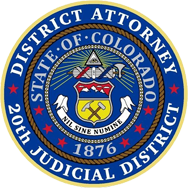What is Restorative Justice?
Restorative justice (RJ) is an approach to crime that focuses on accountability and repair of harm to those affected by the offense, including victims, family, and community. Accountability for the person who caused harm means actively accepting responsibility, hearing and acknowledging the impact of their actions, and taking steps to repair the harm caused by their offense.
Restorative practices date back thousands of years and are based on indigenous, communitarian values from cultures around the world. At its core, restorative justice emphasizes a collaborative, inclusive process where all involved parties can voice their experience and work towards an agreement that meets everyone’s needs rather than focusing solely on punishment.
The Boulder DA’s in-house Restorative Justice Program (DARJ) provides restorative justice services for eligible cases that come to the DA’s Office, primarily diversion cases. DARJ provides the following restorative justice services:
- Victim offender dialogue
- Community group conferencing
- Restorative conversations
- Restorative justice training
A restorative justice conference is a structured, facilitated meeting where the person harmed by an offense and the person who caused the harm can come together to discuss the impact of the offense and collaboratively develop a plan for what the responsible party will do to make things as right as possible for everyone affected. This meeting may include support people, members of the community, and others who were affected, depending on the situation and the needs of those involved. Restorative justice conferences are facilitated by highly trained DA staff or volunteers and may be held in person or online.
Participation in RJ is always voluntary and everyone who attends will be well prepared before coming together to meet. Defendants do not receive any benefit to their case for participating in an RJ conference.



